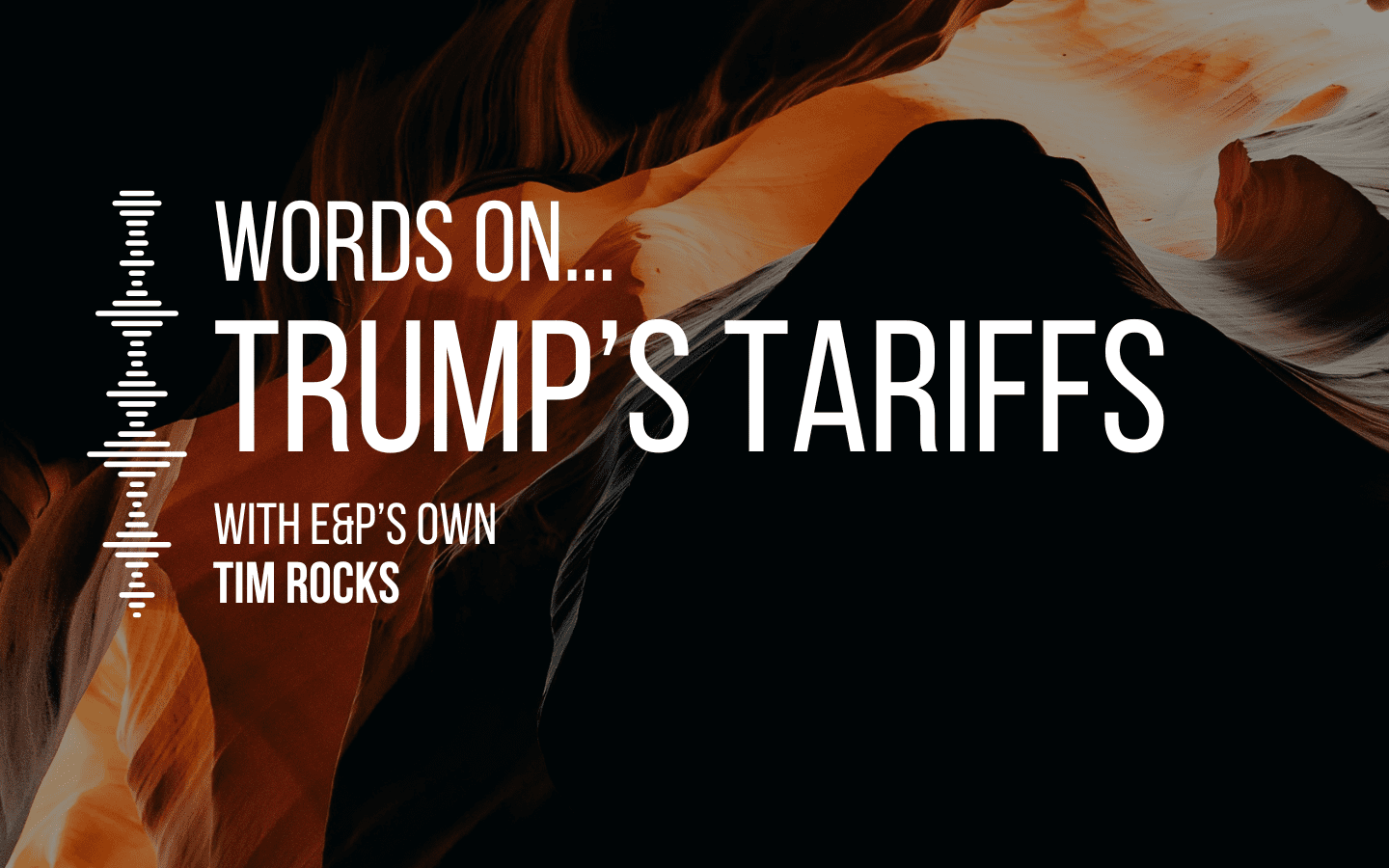


In this week’s episode of Words on Wealth, Tim Rocks is joined by Irene Tunkel, Chief US Equity Strategist at Bank Credit Analysts. They dive into the current state of the US economy, exploring the impact of Trump 2.0 policies, tariffs, and uncertainty on markets and company earnings. Irene also shares insights on US equities, sector opportunities, and strategies for navigating volatility. Tune in for expert analysis on the shifting economic landscape and how it’s shaping investment decisions.
This episode is also available on Apple Podcast.
Tim Rocks
Hello, and welcome to words on wealth. I’m Tim Rocks chief investment officer at Evans and partners. With me today, I’m delighted to have Irene Tunkel, who works for bank credit analysts, which is one of the independent research use a lot. Irene is the Chief US equity strategist. So we’ll have some great perspectives on what’s going on in the US and what it means for the US market and perhaps some opportunities that are emerging in the market as a result of the recent volatility. So welcome, Irene, and thank you very much for joining us. Okay, let’s, let’s begin with where we have to begin, I think, which is with the policy and the politics. So just take us through what you think, like, is there a coherent plan behind all this sort of policy chaos? And if there is, you know, how do you see that sort of playing out in coming months?
Irene Tunkel
Yeah, I think it’s actually the most frequently asked question, and especially if you’re very far away from the US, there is lots of noise emanating. There’s so much news. You would have thought that President Trump had been inaugurated like two years ago, considering how much he has managed to do. And it’s only what, I don’t know, seven weeks. And it’s very hard to separate the signal from the noise. So what is that they’re trying to do with all the executive actions, with all this announcement? So I feel there is lots of confusion, both in the US actually and abroad. And I think that what we need to keep in perspective is that this is not just a set of separate, completely distinct policies, but this is something that is part of the overall program. And the program is to, what Trump 2.0 is all about is to rebalance the US economy, toward this flyover zone. So we want to bring back the manufacturing. He wants to expand industrial production. Industrial production in the US has been hollowed out over the past 20 years. I was actually reading yesterday, which was quite interesting that US actually has great supplies of rare earths, know, that we need for semiconductors, that we need for, you know, phone displays. The problem is that we don’t know, we don’t have the ability anymore to process them. So, we actually get them out of the ground, we ship them to China, they get processed in China. You know, this precious metals get extracted and then they’re sent back to the US. And I think there is some point to this policy that we cannot as a country, I guess we cannot continue this way because we need to maintain our industrial base because it’s something that’s our, you know, behind our, you know, international standing and our independence. So I think that a lot of Trump 2.0 is trying to do is to rebalance the economy. And then Scott Bessent, what does Scott Bessent with his 333 plan, what is 333? Three is he wants to reduce the budget deficit to 3%, which is an admirable goal. We don’t know if it’s possible, probably not. He wants to have 3% GDP growth, which is he wants to grow, you know, and the three extra, I think billions of barrels of oil per day. So the objective of this program is that we have to deal with our debt to GDP ratio, which currently stands at 122%. This is the level that we have lost during the Second World War, which is really atrocious, I would say, if I’m to give an emotion to this. Our interest expense has exceeded spending on the national security. So we really have to do something. And the whole goal of Bicinomics is to stabilize debt to GDP ratio. So he wants to grow out of debt. He wants to reduce budget deficit. And what he really wants is lower interest rates. He wants very easy monetary policy. So effectively, we are talking about tight fiscal and easy monetary policy. Why he cares about $3 billion of barrels of oil? Well, because it is something that’s very tightly related and actually tracks consumer inflation expectations. So you cannot really defeat inflation and get low interest rates unless you have low price of gasoline at the pump. And so it all comes together. So what are the constraints? This administration does not want to raise taxes. So because one of the ways to get out of debt, you tax your way away. You tax your way. And you kind of, you know, stabilize that. I think that one of the things that we see is that that is so large that I don’t even know if you can pay for that with some tax hikes. And second, it’s just not something that’s palatable either to Trump, but also to American people, because the main complaint of Americans is that their quality of life has declined. So they’re all complaining that because of inflation, they don’t have money. Well, guess what? If you raise taxes, it’s like inflation. Inflation is a tax. So these are the limitations.
Tim Rocks
Yeah, yeah. And so the recent debate has been whether both Besson and Trump are willing to risk a recession in the short term to achieve those goals. And I guess the reason recent noises have not been great. It sounds like they are willing to take that short term gain for the potential for long term gain. I mean, that sounds pretty dangerous to me. What’s your thoughts on that?
Irene Tunkel
Well I think that this is true. And I think that when Trump said that, you know, China thinks in terms of a hundred years and the US thinks in terms of quarters, that’s a no-go. So we need to think over a longer investment horizon and just generally longer horizon. So the way they think about it, I do not think that they want to cause a recession per se in the same way that Jeremy Powell did not want to cause a recession when he was raising interest rates to reduce inflation. However, when Powell was asked, do you really want the country to experience pain just to bring inflation back to 2%? He was very confident that it’s worth it. Right? So, I think that this administration may think about it in pretty much the same terms. They feel that the whole rebalancing of the economy and the goal of stabilizing debt to GDP and potentially reducing debt to GDP ratio is worse short-term disturbance and pain. Powell is extremely diplomatic. Trump is not. But really, if you think about the story, it’s very similar. One was the story of tight monetary policy that can cause a recession. This is the story of tariffs and tight fiscal policy that can cause a recession. But at the end of the day, for the benefit of the longer term, for the good of the country, this might be worth it. And Trump is very early in his term. He still has time for deepening growth and then some recovery and still they can achieve 3 % GDP growth over the whole four year term and also be in good shape even before the P-terms. You cannot time a recession, you’d never know how long it will last. It’s always a danger. It is the same kind of danger that Powell was willing to take on. But if you think about the long-term sort of effect of your actions, they think that this is worth it.
Tim Rocks
Yeah, yeah. So can we then jump to what this might mean for companies? We haven’t talked in detail about tariffs yet. But there is a risk I think isn’t there that are of increase causes a hit to US margins. There’s also the potential risks to earning from that slow down. What’s your take on the earnings outlook and what’s currently being perhaps forecast by analysts.
Irene Tunkel
Well, earnings growth expectations have been cut fairly sharply. Having said that, they always start the year sort of higher than where they end the year. But I think that the deterioration that we have experienced since the beginning of the year in terms of expectations is faster than usual. Why? Because I think that analysts are starting to price in the effect of tariffs. The effect of uncertainty. So to my mind, actually, uncertainty about tariffs and this, know, wait and see more than this get and this back and forth, you know, we, you know, Trump announces tariffs, then he backs off and all this, you know, negotiating game that he gets himself into. I think that this is even more detrimental to growth than potentially tariffs. My outlook, you know, for tariffs is perhaps a little bit more benign than you would hear from other strategists. And the reason for that, that US companies are extremely good at retooling their supply chains. They’ve been extremely effective during COVID. So I think that if they know what is the danger, what are the tariffs, which companies, which industries will be taxed, they will be able to sort of work it out. But at the moment, they don’t know. And I think uncertainty is starting to kill growth. And it also starts to weigh on consumer confidence.
Tim Rocks
Okay, that’s interesting. So you think that the companies will be kind of adaptable to the changes. However it must be very difficult, perhaps the companies are the most extreme where their supply chain crosses multiple borders. How, I mean, must be difficult for them to quickly adjust, particularly when the rules, you know, potential rules keep changing every few weeks. So yeah, isn’t that the problem that that if you don’t know the rules, that then you just sort of freeze and you know, if you’re not even going to increase your investment and build that new plan yet, because you don’t really know what the rules are. You also don’t know whether in four years time, you’ll have the Democrats that will come in that will reverse all of these policies too. Doesn’t it just create – doesn’t whole system just freeze to some degree?
Irene Tunkel
Yeah. I agree with you. So you cannot play the game if you don’t know the rules. And at the moment, uncertainty is so high that companies just do not know the rules. During COVID, they knew exactly what is happening and they worked out how to deal with it very fast. In this case, they really do not know. And that’s why I believe that this sort of uncertainty, not knowing what is going to happen, this instability, this is what is paralysing companies and that is also something that’s affecting their growth. If they do know, for example, that there will be some sort of tariff of 25% for every single car that crosses the Mexican border, I believe that in several quarters, you know, lots of production companies will bring production back to the US. I think in principle it’s doable. I don’t think they will enjoy it and it will have some cost, but in principle they could reconfigure their businesses and they can play the game again. What is difficult at the moment is that they cannot really make a move.
Tim Rocks
Yeah. Alright, so then the hard question is what this means for the market overall? What’s your take? mean, obviously, we’ve had, well, we had a correction an official correction at some point. That’s a little bit off that now. But is that enough of a fall? What is your view on equities now from here?
Irene Tunkel
I think that a short-term rebound, we already have seen a really strong market performance yesterday. think a strong rebound can be possible just because correction was quite fast. The S&P 500 lost 10% in something like three weeks. That’s very fast. But I think that we need to think about the longer term outlook for equity. So let’s just not think in terms of three to six weeks because three to six weeks can actually be brilliant. I think that if we think about what is going to happen till the end of the year, that is a little bit more challenging because whether the Bicinomics is the right plan, whether Trump 2.0 is the right medicine for the US economy, I think that the beginning of that process, the early stages are bound to be fairly turbulent, they are bound to be quite painful. And so the economic headwinds actually are going to put pressure on equities. And another thing that concerns me is that uncertainty seems to be sort of a feature, not a bug of this administration. Trump uses uncertainty as something that gets concessions out of his opponents and his friends. So it’s actually negotiating too. So I would expect that uncertainty will stay elevated. Volatility will likely stay elevated. There will be some downward pressure on earnings, probably more than what we have seen so far, both from tariffs and also from uncertainty. And also there is a bit of a sort of concern about consumer spending because consumers also feel this worries about the jobs and the job cuts and consumer confidence has declined. So in principle, think that probably earnings are not going to surprise us a lot on the upside from where we are. In terms of valuation, yes, the multiple has pulled back, but it’s very hard to see it expanding much more and getting to the new highs just because there is not so much enthusiasm behind the stock market anymore. And that basically makes me think that probably tilting portfolio, giving portfolio defensive tilt is still the right strategy despite some updates that we have seen over the past week. I think we need to prepare for elevated volatility so nothing changes. We have to prepare for slowing growth in the US. I don’t think it will be changed by, you know, we will get some good news over the next week or two or next month. I think that the economy is slowing and has been slowing actually for a while. And so I think that my prescription would be kind of lower portfolio beta, perhaps have some cash for new opportunities. And I think that probably time for cyclicals has not come yet.
Tim Rocks
Okay. All right. So that sounds like it’s a two to three, well, perhaps the whole term of being cautious from here.
Irene Tunkel
I’m not sure if it’s an entire Trump term because I think that some of the worst parts of the agenda are coming early on so tariffs, for example, and they’re killing growth eventually. I think that maybe, you know, in a while we will see some benefits of some of, you know, budget cuts. It’s painful at the beginning, but it’s actually going to produce some positive results a little bit later on. Maybe we will get the regulation that also takes time. cannot deregulate the economy without executive order because you have to go through all these rules and you have to council some of them. So I think that the better part of the economy, some parts that will jumpstart growth, probably a little bit down the road. But I think that the early part of the term is probably going to be quite turbulent.
Tim Rocks
Yeah. And then the other thing we haven’t talked about yet is the magnificent seven versus the rest because it’s, it’s odd that all of the downturn in the market was the magnificent seven and the rest of the market was about flat during that period. But what you’re describing is, you should have broader concerns if the consumer is going to slow if companies are going to freeze to a degree and that earnings hit the rest of the market. Anyway I don’t want to put words in your mouth but so how do you see the magnificent seven versus sort of the rest story from here.
Irene Tunkel
Well, I think that the Magnificent 7 got very fully valued. And so there was general feeling that we cannot really make that much money off this bunch because it’s up so much over the past two years. And I think that gave a rise to this growth value trade. So I personally consider out of the Magnificent 7 towards Chinese tech, out of the US into Europe. All of that is basically an extension of growth value trade. people are looking at profits and then they’re thinking where can I park the money? There are outflows from the US, there is downward pressure on the dollar. So all of that I think is fitting together as profit-taking, looking in gains and looking for new opportunities. The Magnificent 7 are down, maybe not after yesterday, but they were down like about 20%. They are not that terribly expensive actually at the moment. There are still some companies, there is a bit of disenchantment with General TVI going on. But this is kind of consistent with this Gartner technology adoption curve. First, the market is already enthused about the new technology and then they don’t see immediate results and everyone is going into this trough of disappointment because, we were promised flying cars and we got the internet. Now everyone is saying we were promised this general intelligence and what we have is just an advanced search engine. But I think that a little bit down the road, we will actually see significant productivity improvements from the technology may not necessarily be from the Magnificent 7. It may be elsewhere like in healthcare, maybe in supply, in defence or some other industries. But the Magnificent 7, still, maybe they will not be on the forefront of innovation, but they’re solely businesses and they are investing in the servers, but the servers are needed actually for other companies that want to work on their generative models. So I think that at some point the price is right and maybe even now. I think that there will be probably a short term rebound in the Magnets and 7, they kind of got oversold. But I think that the easy part is definitely over.
Tim Rocks
Yeah. Okay, and have you seen any other opportunities arise from the recent volatility? I’ve seen some other talking people talking about, you for example, the healthcare sector being neglected for a while. What other kind of parts of the market do you think are interesting?
Irene Tunkel
We are over with healthcare and healthcare was one of those sectors. Earnings growth was revised up and things were looking better after this post-COVID sort of hangover, but still the sector would not move. And that was actually kind of strange, right? I think that overhang was from the concerns about the policy and, know, MAHA (Make America Healthy Again) and, you know, basically it’s a very political sector. But I think that now what people are looking at, will be strong earnings growth. It’s a defensive. In a sense, you can say that this is also a valid trade because this is not a sector that has been performing. And so you cannot really look in gains there. So you cannot fall below the floor, so to say. But now there are actually opportunities in terms of, you know, people are much more aware of opportunities in terms of earnings growth. So they’re buying actually earnings. So it’s not just defensive play. Telecom has done extremely well, but I think that maybe that trade is a little bit stretched, became overbought. Utilities, it has been discovered, but it’s a defensive sector and it’s kind of chugging along quite well. Consumer staples of defensive is something that would worry me the most because if we’re that lower middle class consumers are under pressure, consumer staples are not going to do amazingly well. And we looked at them and they don’t really have a pricing power anymore. Moreover, everyone is worried about MAHA, make America healthy again, in terms of health care. But I actually think that the most immediate effect would be on consumer staples because the movement is to make American food healthy. And that is directly to companies that sell food, food producers.
Tim Rocks
Yeah, yeah. Okay, great Irene. We’re running out time. That’s all been very useful. There’s just so much going on, so much information to digest, you’ve done a good job of putting it all together. So I guess we’ll just enjoy the wild ride for a few more years.
Irene Tunkel
Yeah, it won’t be boring, I think.
Tim Rocks
Thank you very much for your time, Irene.
Irene Tunkel
My pleasure. Thank you. Bye-bye.
Tags
Disclaimer
This podcast was prepared by Evans and Partners Pty Limited AFSL 318075.
Any advice is general advice only and was prepared without taking into account your objectives, financial situation or needs. Before acting on any advice, you should consider whether the advice is appropriate to you. Seeking professional personal advice is always highly recommended. Where this presentation refers to a particular financial product, you should obtain a copy of the relevant PDS, TMD or offer document before making any investment decisions. Past performance is not a reliable indicator of future performance.
Directors, employees and officers of Evans and Partners and its related bodies corporate may have holdings in the securities discussed. Any taxation information is general and should only be used as a guide.
This communication is not intended to be a research report (as defined in ASIC Regulatory Guides 79 and 264). Any express or implicit opinion or recommendation about a named or readily identifiable investment product is merely a restatement, summary or extract of another research report that has already been broadly distributed.


